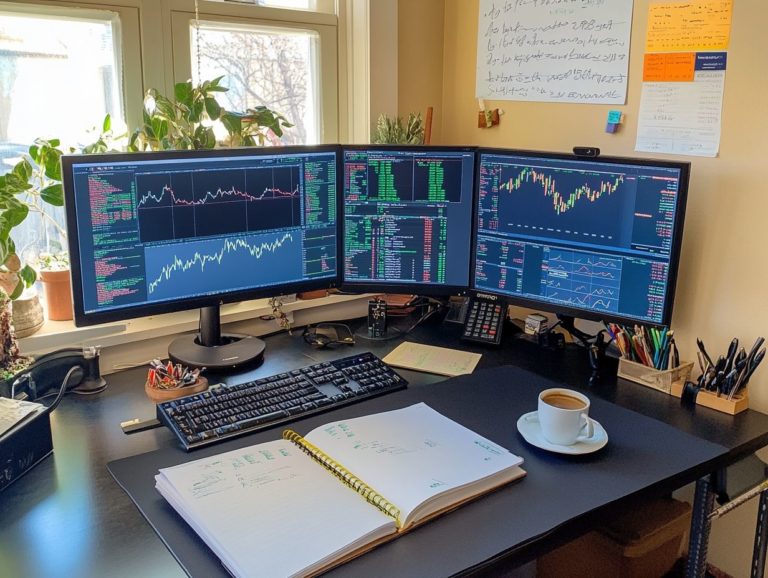How to Avoid Emotional Trading Decisions
Emotional trading can lead you down a costly path, derailing even the most disciplined investors. When feelings like fear and greed take the wheel, they can cloud your judgment, resulting in impulsive decisions that threaten your long-term goals.
This article delves into the definition and impact of emotional trading, highlighting the common triggers you should be on the lookout for, along with the risks involved. You’ll also discover effective strategies and tips to keep your focus sharp on your trading plan, plus guidance on when it might be wise to seek professional help.
By understanding and managing your emotions, you can navigate the trading landscape with enhanced confidence and clarity.
Contents
- Key Takeaways:
- Understanding Emotional Trading
- Common Emotional Triggers in Trading
- The Risks of Emotional Trading
- Strategies to Avoid Emotional Trading
- Tips for Sticking to Your Trading Plan
- Seeking Professional Help
- Frequently Asked Questions
- What is emotional trading and why is it important to avoid it?
- How can I identify if I am making emotional trading decisions?
- What are some ways to avoid emotional trading decisions?
- Why is having a support system important in avoiding emotional trading?
- What are some techniques for managing emotions while trading?
- Is it possible to completely avoid emotional trading?
Key Takeaways:

- Recognize that emotional trading can severely impact your decisions, potentially leading to risky and impulsive actions.
- Be aware of common emotional triggers like fear and greed, and manage them effectively.
- To avoid emotional trading, establish a solid trading plan, stay mindful of your emotions, and seek professional help when needed.
Understanding Emotional Trading
Emotional trading encompasses the mental influences that impact your decision-making as an investor. These influences can often lead to irrational actions, resulting in significant repercussions within financial markets.
This phenomenon is intricately linked to market psychology and is fueled by powerful emotions like fear and greed. These emotions can distort rational thinking and trigger common thinking errors that affect decision-making.
Grasping the implications of emotional trading is essential for crafting investment strategies that effectively mitigate risks, especially in volatile market environments.
Definition and Impact on Trading Decisions
The definition of emotional trading highlights how emotional investing can greatly influence your trading decisions, especially in volatile market conditions.
You may often find yourself swayed by feelings like fear, greed, and excitement. These emotions can cloud your judgment and lead to impulsive choices. Positive emotions, such as confidence and optimism, might tempt you to chase high-risk investment strategies. Meanwhile, negative emotions could push you to retreat at crucial moments. To effectively manage this emotional tug-of-war, it’s essential to learn how to handle market volatility emotionally. This understanding can help prevent a rollercoaster effect on your trading performance, where decisions driven by passion rather than logic frequently result in losses.
By understanding how emotions affect you, you can navigate these psychological challenges and craft more robust investment strategies.
Common Emotional Triggers in Trading
In trading, you ll encounter common emotional triggers such as fear, greed, and various cognitive biases. These factors can significantly distort your perception of market sentiment, potentially leading you to make impulsive decisions that may not align with your strategic objectives.
Fear, Greed, and Other Emotions to Watch Out For
Fear and greed are two of the most critical emotions to be vigilant about in trading. They can easily lead you into emotional traps and spur impulsive decisions, ultimately resulting in costly trading mistakes.
These feelings can cloud your judgment, pushing you to act without fully weighing the potential risks. For instance, when the market takes a nosedive, an overwhelming sense of fear might compel you to hastily sell off your assets, locking in losses instead of waiting for a possible rebound. On the flip side, unchecked greed might drive you to chase after soaring stocks without proper analysis, leading to overexposure and significant losses.
Other emotions, like anxiety or euphoria, can further muddle your decision-making process, creating a cycle of erratic trading behavior influenced more by psychology than by sound strategies.
The Risks of Emotional Trading

Emotional trading carries serious risks that can shake up your portfolio and derail your financial goals! Understanding these dynamics is vital if you want to stay disciplined and learn how to make informed trading decisions to succeed in the ever-changing market!
These risks can significantly impact your portfolio and obstruct your pursuit of long-term financial goals, particularly in the midst of market volatility.
Impact on Portfolio and Long-Term Goals
The impact of emotional trading on your portfolio can be quite severe. To avoid this, it’s important to recognize the emotional cycle of trading, as it can jeopardize your long-term goals, such as achieving capital gains and building emotional resilience.
When your decisions stem from fear, greed, or anxiety, you might make impulsive moves. This includes buying high during market euphoria or selling low in moments of panic.
These choices can alter your financial trajectory. They may prevent you from maximizing your investments. By cultivating a mindset anchored in reasoned analysis rather than knee-jerk reactions, you can navigate market fluctuations with greater ease.
Building emotional resilience is essential. It allows you to remain steadfast in your strategies while avoiding the traps of emotional volatility. Maintaining a balanced perspective safeguards your portfolio and keeps you aligned with your long-term financial objectives.
Strategies to Avoid Emotional Trading
To sidestep the pitfalls of emotional trading, you can adopt a range of strategies, such as overcoming emotional trading with strategies, that prioritize self-awareness and mindfulness techniques. This approach enhances your ability to manage risks and cultivate a disciplined trading mindset.
Embracing these practices allows you to navigate the market with greater clarity and composure.
Self-Awareness and Mindfulness Techniques
Self-awareness and mindfulness techniques are essential for developing emotional resilience in your trading activities. They enable you to maintain a constructive mindset through positive self-talk.
By cultivating a strong sense of self-awareness, you can identify your emotional triggers. This awareness allows you to respond thoughtfully instead of reacting impulsively.
Mindfulness practices, such as meditation or focused breathing, serve as effective tools for centering yourself during turbulent market conditions. For example, taking a few moments to breathe deeply can help clear a cluttered mind, giving you the clarity needed to assess your trading strategies effectively.
Journaling about your daily trades encourages reflection and reveals patterns in your emotions and decisions. This practice can be fine-tuned for future improvement. Over time, these techniques establish a solid foundation that enhances your emotional resilience and supports a disciplined and balanced approach key components for successful trading.
Tips for Sticking to Your Trading Plan
Sticking to your trading plan is crucial for lasting success. It requires the discipline to push through the challenges. It’s essential to set realistic goals and commit to effective trading strategies that will guide you through emotional pitfalls and the ever-changing landscape of market trends.
Setting Realistic Goals and Sticking to a Strategy

Setting realistic goals is crucial for developing a successful trading strategy. Your goals should align with your risk tolerance and adapt to the ever-evolving market landscape for the favorable trading outcomes you seek.
Begin by assessing your individual risk tolerance the degree of variability in investment returns that you’re prepared to handle. This self-assessment is pivotal for crafting achievable financial targets that resonate with your comfort level and psychological readiness for market fluctuations.
A comprehensive approach requires you to regularly evaluate current market conditions. These conditions can significantly impact the feasibility of your established goals.
By maintaining the flexibility to adjust your strategy as needed and staying attuned to external factors like economic indicators, you can refine your approach. This not only makes your goals more realistic but also enhances the likelihood of achieving successful results over time.
Seeking Professional Help
Seeking the expertise of a financial advisor can offer you invaluable insights into investment opportunities. This guidance elevates your trading performance while strengthening your trading discipline.
When to Consider Consulting a Financial Advisor
You should consider consulting a financial advisor when faced with significant investment risks, especially during periods of market volatility. When emotions start to take over your decision-making, it’s time to seek help.
These professionals bring a level of clear thinking and knowledge that can be invaluable during turbulent market conditions. Panic or overconfidence can easily cloud judgment. For example, when stocks suddenly drop, individuals often instinctively sell off assets, which can lock in losses. A financial advisor can provide strategic insights, helping you decide whether to hold steady or diversify your portfolio in line with your financial plans for the future.
In emotionally charged situations, such as dealing with a substantial financial loss, having a trusted advisor can provide much-needed guidance. This ensures your decisions are based on rational thought instead of impulsive reactions.
Frequently Asked Questions
What is emotional trading and why is it important to avoid it?
Emotional trading occurs when a trader makes decisions based on their feelings rather than objective analysis. It’s crucial to avoid emotional trading because it can lead to impulsive and irrational choices, resulting in financial losses.
How can I identify if I am making emotional trading decisions?

Signs of emotional trading include feeling anxious, panicking, or being overly excited while making trades. It may also show up as constantly checking the market, ignoring risk management strategies, or straying from your trading plan.
What are some ways to avoid emotional trading decisions?
One effective way to avoid emotional trading is to have a clear trading plan and stick to it. Additionally, learning how to avoid emotional trading decisions can help you practice self-control and minimize the impact of feelings during volatile times.
Why is having a support system important in avoiding emotional trading?
A support system, whether through a mentor or a community of traders, can provide valuable insights and perspective. They offer emotional support and help keep you accountable for following your trading plan.
What are some techniques for managing emotions while trading?
Techniques for managing emotions while trading include taking breaks, practicing mindfulness, and setting realistic goals. Focusing on long-term success rather than short-term gains or losses is also beneficial.
Is it possible to completely avoid emotional trading?
While it may be difficult to eliminate all emotions from trading, you can minimize their impact by following a structured trading plan and practicing self-control. Understanding the relationship between trading and emotions is essential, as emotions are a natural part of human behavior, but it’s crucial not to let them cloud your judgment while trading.






